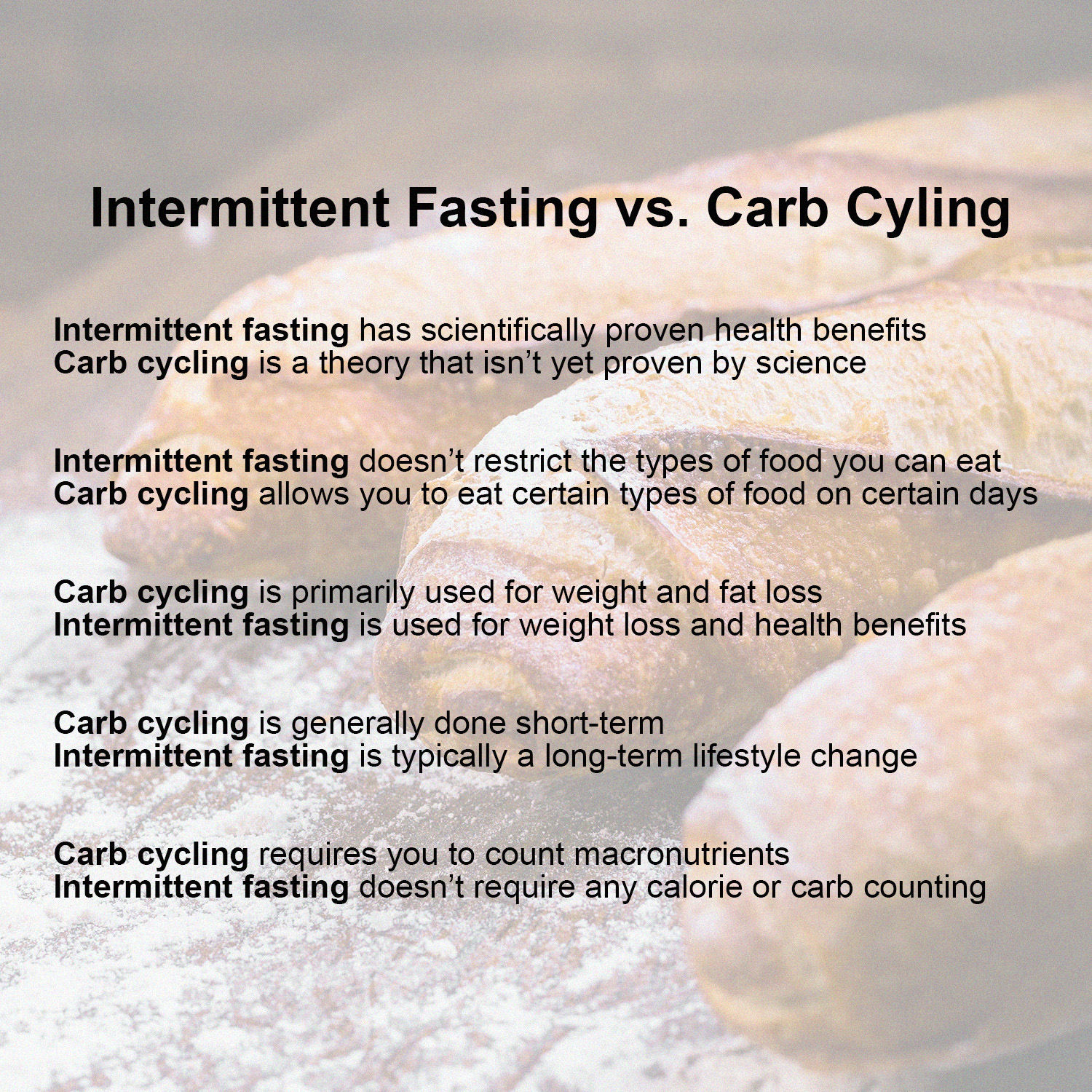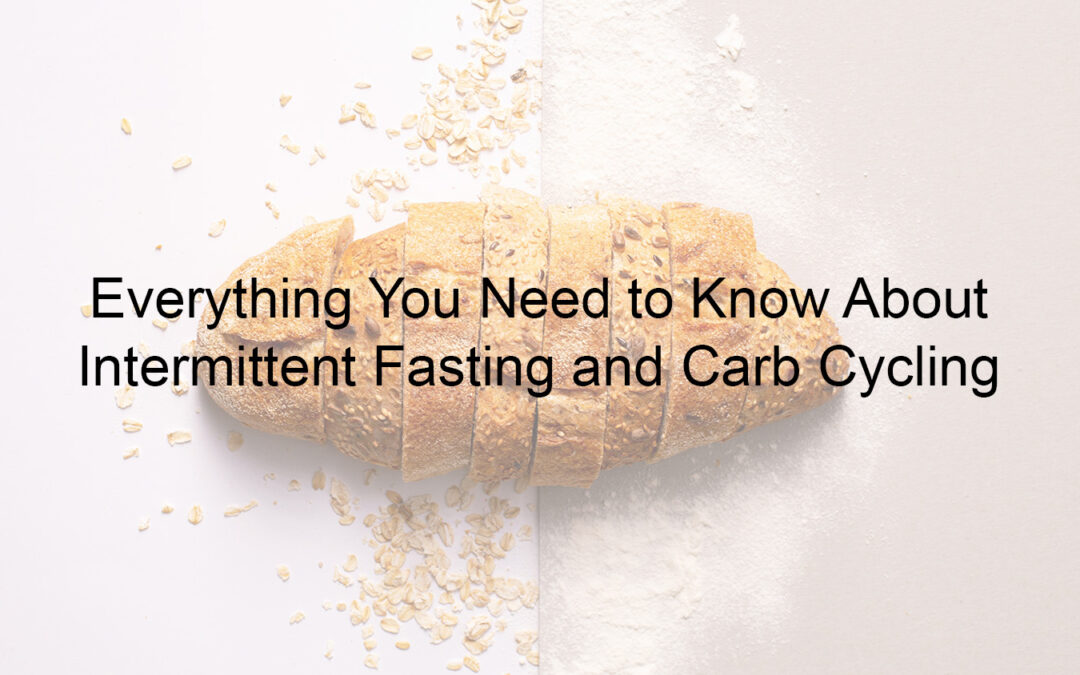Are you considering doing intermittent fasting and carb cycling? Carb cycling and intermittent fasting are two approaches to eating food that can help you regulate blood sugar, lose weight, and gain muscle.
So, should you do intermittent fasting or carb cycling? Which is better for helping you reach your goals?
In this blog, we’re taking a closer look at intermittent fasting and carb cycling, including what they are and how they compare.
What is Carb Cycling?
Carb cycling is a favorite for athletes and bodybuilders who want to get more muscle or drop body fat while still having enough energy for intense physical activity. It’s also gaining popularity in weight loss circles. So, what is it exactly?
Carb cycling is a variation of a low-carb diet that involves alternating the number of carbohydrates you eat each day. Essentially, you go between high-carb and low-carb days based on your exercise routine.
For example, you eat more carbs on the days you’re more active and fewer carbs on the days you’re less active.
So, what’s the idea behind carb cycling? Essentially, when you eat carbohydrates, your blood sugar rises, which causes your pancreas to make more insulin to break down and store the glucose. At this point, your body either converts the glucose into energy or stores it for later (aka turns it into fat).
However, when you eat too many carbohydrates, your body makes too much insulin which can lead to weight gain and other health consequences like type 2 diabetes. The idea with carb cycling is that on low-carb days you give your body time to burn the extra glucose instead of storing it.
It’s important to note that you can still gain weight if you don’t exercise enough on your high-carb days. It’s also worth noting there’s very little science investigating carb cycling and its effectiveness.
What is Intermittent Fasting?
Intermittent fasting is an eating pattern of cycling between periods of fasting and eating. There are several different schedules for intermittent fasting, such as:
- The 5/2 Schedule (where you eat five days and fast two).
- 16/8 Schedule (where you intermittent fast for 16 hours and eat for eight in a 24-hour period)
- Alternate Day Fasting (where you fast on alternate days)
Intermittent fasting has been around for centuries, but it’s recently gained popularity as a way to lose weight, improve metabolic health, or for the many other health benefits of intermittent fasting.
Intermittent fasting doesn’t restrict what you eat but rather when you eat. As a result, it’s less like a diet and more like a way of life. Many people appreciate the flexibility of intermittent fasting because it enables them to get results without sacrificing their quality of life or favorite foods.
There’s also a ton of research supporting the benefits of intermittent fasting, and it’s considered safe for most people.
How does it work? In short, when you fast, your body uses up stored carbohydrates for energy and then shifts from using glucose for energy to using fats for energy. Fasting also causes a decrease in insulin levels which helps regulate blood glucose levels and insulin resistance.
All of these mechanisms lead to weight loss and improved metabolic function. In addition, intermittent fasting also reduces inflammation and improves digestion, contributing to its ability to help many health conditions.
Intermittent Fasting vs Carb Cycling

Clearly, these two ways of eating are different. But how do they compare? Let’s take a quick look at their similarities and differences.
Intermittent fasting and carb cycling are both schedule-based dietary plans that each have some allowance for your favorite foods. They both can:
- Help you lose weight.
- Balance your insulin levels.
- Help you gain muscles.
There are some noteworthy differences, too:
Intermittent fasting has scientifically proven health benefits
Carb cycling is a theory that isn’t yet proven by science
Intermittent fasting doesn’t restrict the types of food you can eat
Carb cycling allows you to eat certain types of food on certain days
Carb cycling is primarily used for weight and fat loss
Intermittent fasting is used for weight loss and health benefits
Carb cycling is generally done short-term
Intermittent fasting is typically a long-term lifestyle change
Carb cycling requires you to count macronutrients
Intermittent fasting doesn’t require any calorie or carb counting
Ultimately, these two dietary options are pretty different. The best option for you will heavily depend on your unique goals, preferences, and workout routine.
For example, if you want more flexibility or are focused on improving your health, then intermittent fasting is probably a better choice. On the other hand, if you’re trying to build lean muscle as fast as possible, carb cycling might be a better option.
Consider Intermittent Fasting and Carb Cycling Together
Who says you have to choose? Many people adopt both approaches to maximize their results. However, most people start with one or the other first because it can be overwhelming to do them simultaneously.
Each requires a bit of scheduling and planning, so consider starting with the one that seems easiest to you first. Then, add the other one in when you’re ready for more. Keep in mind that your exercise routine will be important in creating your schedule.
You’ll likely want to save your heavier exercises for high-carb days and avoid them during fasting periods. You’ll also need to track your carbohydrates closely with carb cycling to make sure your macros are in check.
Need Help Integrating Intermittent Fasting and Carb Cycling?
In the end, intermittent fasting and carb cycling are two dietary approaches to losing weight and feeling great. The right one for you will totally depend on your long-term goals and preferences. It’s also totally possible to do both at the same time!
As an intermittent fasting coach, I love helping people reach their health and weight loss goals. I can help create an intermittent fasting program that works for you. So, if you’d like to incorporate carb cycling as part of your plan, I can help you do that, too.
Reach out today to schedule your free consultation.




